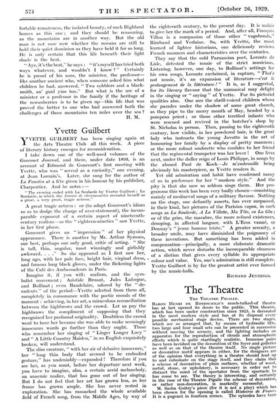Yvette Guilbett
YVETTE GUILBERT has been singing again at the Arts Theatre Club all this week. A piece of literary history emerges for reconsideration.
I take down one of the well-used volumes of the Goncourt Journal, and there, under date 1893, is an account of Edmond de Goncourt's first meeting with Yvette, who was "served as a curiosity," one evening, at Jean Lorrain's. Later, she sang for the author of La Faustin at a fete given in his honour by his publisher, Charpentier. And he notes :— " The evening ended with La Soularde by Yvette Guilbert ; La Soularde, in which the dieeuse de chaneonnettes revealed herself as a great, a very great, tragic actress."
A great tragic actress : or (to adapt Goncourt's idiom so as to dodge the charge of over-statement), the incom- parable exponent of a certain aspect of nineteenth- century realism—so the " eighteen-nineties " saw Yvette, in her first phase.
Goncourt gives an " impression " of her physical appearance. There is another by Mr. Arthur Symons, our best, perhaps our only good, critic of acting. "She is tall, thin, angular, most winningly and girlishly awkward. . . ." So she appeared as I first saw her, long ago, with her pale face, bright hair, virginal dress, . and famous long black gloves, under the flickering lights of the Café des Ambassadeurs in Paris.
Imagine it, if you will: realism, and the sym- bolist movement ; Aristide Bruant, Jules Laforgue, and Rollinat ; even Baudelaire, adored by the " ,de- cadents " of the period—Yvette selected from them all, completely in consonance with the poetic moods of the moment : achieving, in her art, a miraculous reconciliation between the highbrows and the crowd. Let us pay the highbrows the compliment of supposing that they recognized her profound originality. Doubtless the crowd went to hear her because she was able to make seemingly innocuous words go further than they ought. Those who remember her singing of "Linger Longer Lucy" and" A Little Country Maiden," in an English exquisitely broken, will understand.
The slim creature, "with her air of delusive innocence," her "long thin body that seemed to be embodied gesture," has undeniably—expanded ! Therefore if you see her, as you must, before her departure next week, you have to imagine, also, a certain acrid melancholy, an anaemic malice, that has gone out of her singing. But I do not feel that her art has grown less, as her frame has grown ample. She has never rested in exploration. She has ransacked the whole available field of French song, from the Middle Ages, by way of the eighteenth century, to the present day. It is unfair to give her the mark of a period. And, after all, Francois Villon is a companion of those other "vagabonds," Rimbaud and Verlaine. So, with Yvette; the most learned of lighter historians, one deliciously reviews French manners and characteristics over the centuries.
They say that the cold Parnassian poet, Leconte de Lisle, detested the music of the strict musicians. Listening, however, one day, to Rollinat's settings for his own songs, Leconte exclaimed, in rapture, "That's not music, it's an expansion of literature—c'est le prolongement de la littb-ature ! " It is, as I suggested, for its literary flavour that the unmusical may delight in the singing or "saying " of Yvette. For its pictorial qualities also. One sees the shrill-voiced children whom she parades under the shadow of some great church, as they pipe to the merry month of May, headed by a pompous priest ; or those other terrified infants who were rescued and revived in the butcher's shop by St. Nicholas in person. Then, passing to the eighteenth century, how visible, in her powdered hair, is the great lady who instructs the young Javotte in the art of honouring her family by a display of pretty manners ; or the more robust soubrette who confides to her friend that the regimental trumpeter was her lover ! One lives next, under the duller reign of Louis Philippe, in songs by the absurd Paul de Kock—Je m'embrouille being obviously his masterpiece, as Yvette renders it. Yet old admiration and habit have confirmed many of us in preference for her "modern style." And the pity is that she now so seldom sings them. Her pro- gramme this week has been very badly chosen—consisting mainly of mediaeval songs of a military flavour. Nothing on the stage, one defiantly asserts, has ever surpassed, in their kind, her pictures of the Parisian vows; in such songs as La Soularde, A La Villette, Ma Tete, or La Glu; or of the grim, the macabre, the more refined existences, drooping, in affected languor, with L'Eros vanne, or Donnay's " jeune homme triste." A greater serenity, a broader smile, may have diminished the poignancy of these inventions. But something has been added in compensation—principally, a more elaborate dramatic action, which never disturbs the incomparable clearness of a diction that gives every syllable its appropriate colour and value. Yes, one's admiration is still complete. Yvette Guilbert is by far the greatest artist ever formed by the music-halls.
RICHARD JENNINGS.


















































 Previous page
Previous page